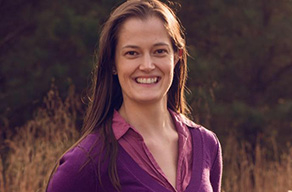My Life Path with Sensory Processing

I’m Sarah Norris and you probably know me from the STAR Institute videos on Sensory Processing Disorder (SPD). Recently, we’ve been asking the adult SPD community to share their sensory stories with us so we can create more community and awareness for all. Today, I’m sharing my story of how I’ve chosen this career and how I address sensory challenges in my own life.... (BUT remember to read Carrie's story too!)
As an occupational therapist, I have gradually become aware of my own sensory processing challenges. As a kid, I was labeled a tomboy, and that pretty well captured my sensory profile. I hated “girly” clothes, loved to play in the dirt and mud, climbed trees, and even broke my collarbone playing rugby with the guys in sixth grade.
As a teen, I was labeled a geek, and that captured me pretty well, too. I loved reading, writing, math, science—everything except history. I was an athlete, musician, in drama, and always, always busy. I attended small private schools and did really well. I was able to explore all my interests with the level of intensity I craved.
Then, college happened. I made it through, but it was a big adjustment and so much harder than high school. The schools I went to for college were too big to know everyone. In fact, I knew almost no one, and didn’t know how to “put myself out there” to meet people very easily. The cafeteria was massive, loud, and always stinky. Assemblies and most of my lecture classes were overwhelming.
I shared a room for the first time since childhood (with a stranger, no less), and my go-to strategy of “escape to regulate” didn’t work. I no longer had a “sensory safe space.” It didn’t help that I really hated my roommate’s musical preferences. I poured myself into my studies, gave up on making friends, and just got through it. I holed up in my dorm room when my roommate was gone, then left for the library or my boyfriend’s apartment when she was around. During that period of time, I was diagnosed with depression, and looking back at that time, it’s no wonder I was depressed. I started counseling and taking medication, which helped me some.
Another layer to my story is that my mom was diagnosed with brain cancer when I was seven. She had a tumor in her frontal lobe that was the size of a man's fist. She underwent brain surgery followed by aggressive chemotherapy and radiation treatments. Doctors did not anticipate her living beyond six months, but she ended up living for more than 20 years after her surgery and subsequent treatments. She was the first survivor for the kind of brain cancer she had. While she was a medical miracle, she was forever changed by her disease. She never returned to "normal."
At the time, doctors had very little understanding about the long-term effects of her cancer and the treatments they used on her. They did not know what to tell my family to expect, nor did they know what supportive services she/we needed. No one really knew. As you can imagine, living with someone who has significant neurological damage had its challenges, not only for me, but for the rest of my family as well. My family and I were fortunate to have many wonderfully supportive people in our lives, but nothing could "fix" my mom or the vast disruption in normalcy her disease caused in our family.
I've done a lot of counseling and worked through a lot of big emotions around losing my mom; once at seven, and again, for good, at 29. The silver lining of all this has been the heart this experience has given me for all people with disabilities, especially those with neurological conditions. I believe growing up with a disabled parent is one of the biggest factors that led me to becoming an occupational therapist.
As an adult, I’ve really poured myself into my job, marriage, and kids, and I really love my life. But I have also experienced a lot of imbalance and have struggled to take care of myself along the way. I’ve done a lot of counseling, read a lot of self-help and therapy process books, and tried various medications. I’ve been diagnosed with fibromyalgia and an anxiety disorder. I’ve worked for years to understand myself and learn to take care of myself.
Being an adult is hard. Most days I cannot believe I am actually considered an adult. On my good days, I consider myself a “highly sensitive person.” On my “sensory” days (where I’m easily overwhelmed and triggered by my sensitivities), I fall more squarely in the Sensory Processing Disorder camp.
My sensory challenges (and those of my children) have honestly made it kind of hard for me to figure out what is normal and what is dysfunctional. Luckily, I work with some really amazing people who help me figure it out as I go. Because of my knowledge about sensory processing, I am pretty sensitive to my kids' sensory needs. They definitely inherited some sensory processing challenges from me. I’ve also noticed my knowledge of sensory processing differences has really helped me understand points of conflict and differences in opinions and preferences between myself and my friends and loved ones. I've found the knowledge of sensory processing (and neurological differences in general) has made me way more understanding and open to others' perspectives than I was before I knew about it.
Here is what I have figured out about my sensory profile so far: My biggest challenge is my over-responsiveness to sounds. The sounds my kids make (especially crying, whining, and screaming) and background conversations are especially challenging for me. I get visually over-stimulated by fluorescent lights and clutter, so grocery shopping is really challenging for me, especially in unfamiliar stores. I react strongly to smells, both positively and negatively. Certain smells really soothe me, but perfume can give me headaches. I am sensitive to light touch and can over-react to being touched unexpectedly, but I love deep pressure touch, fidgeting, and really hot showers. I hate crowds and almost always have a meltdown or migraine during/after professional conferences. I am under-responsive to my bodily sensations, including vestibular (movement), proprioceptive (position), and interoceptive (internal bodily sensation) signals. I have bad posture, need to move frequently to stay awake, keep from getting stiff and sore, and to recognize when I am hungry, thirsty, or need to use the bathroom. I have joint laxity/low tone and get injured easily, especially in my lower back, knees, and ankles. When I am still for too long, I don't pick up on my body signals until they're really strong (like "there's no way I'm making it to the bathroom" strong; pregnancy/birth has NOT helped this challenge).
One huge benefit of my job is that I have amassed a huge volume of information about sensory processing. I’ve found a lot of helpful strategies to overcome my sensory challenges. Some of them are more functional than others. For example, to manage my sound sensitivities, I constantly tell my kids to be quieter, use their inside voices, or that what they are doing is bothering my ears. I use noise-canceling headphones or earplugs often. I keep some high-fidelity earplugs in my purse because I need them anytime I'm shopping, in a busy restaurant, in movies, or at concerts. I've found music and auditory input really affects my energy level. I use brainwave music, guided meditations, or playlists of my favorite artists/songs to help wake me up in the morning, focus at work, drown out noise when I'm shopping or traveling, and calm me down so I can fall asleep in the evenings. My kids know if they want to listen to songs with lyrics in the car with me, they cannot also talk, or I turn the music off. I like background music during dinner, but it can't have any lyrics. I almost never have my phone ringer on and snooze my alarm immediately when it goes off (all 3-5 times). I prefer to read subtitles or transcripts for videos and almost never have the sound on for video games (or if I do, it's at the lowest possible volume). I cannot process very much auditory information without also fidgeting, taking notes, and/or seeing things in writing.
To manage my visual sensitivities, I have taped over everything in my bedroom that emits light with black electrical tape, do my best to conquer clutter in my house (it's SO HARD with kids), and try to get outside in nature at least once a day to soak in some natural lighting and nature scenes. I have an alarm clock with a daylight/sunrise function that turns on about 30 minutes before my sound alarm that helps me wake up in the morning (since I don't let my alarm go off long enough to wake me up). I keep three different kinds of tinted glasses in my purse; sunglasses, "computer" glasses that block blue light, and blue tinted glasses that make driving at night or being in a place with a lot of fluorescent lighting tolerable. My office mates and I never use the overhead fluorescent lights in our office and use lamp lighting instead (I am so fortunate their visual systems are similar to mine).
Things I have found that support my responses to smell are largely related to the environment I am in. In my office, no one wears perfume/cologne or uses strongly scented body products. I personally use unscented or naturally scented products for washing my clothes, cleaning, and bathing. I love essential oils and have a pretty big collection of scents that I use for a variety of purposes. When I am not in a supportive environment, I tend to breathe shallowly because it protects me from getting big whiffs of unpleasant smells.
As far as touch goes, I have always loved big, long, tight bear hugs. Weight, pressure, heat, and vibration are hugely calming for me. I have a 20-pound weighted blanket that really helps me relax and unwind. I have a cat who loves to lay on my chest and purr loudly - it's the best thing ever. I usually enjoy snuggling with my kids or husband, although sometimes I can't handle it. My husband has learned he cannot touch me without warning me and getting permission first, especially if I'm immersed in a task and don't see it coming (I may have hurt him and/or his feelings more than once). I take super-hot showers and constantly turn up the heat to cancel out the sensation of the water droplets on my skin. I tend to dress in layers and keep blankets handy because I do not like being cold or being touched by anything cold (another thing my husband has learned to put up with my over-reactions about).
As I mentioned before, I use sound, visual input, smells, and touch input to help me regulate. I also rely heavily on caffeine, chewing gum, and video games. I struggle with being motivated to get up and move, especially when I'm really focused on a task, but man, does it make a difference. I have a smart watch that reminds me to get up and move every hour if I haven't, which really helps me remember to at least get out of my chair and stretch, go to the bathroom, or get a drink of water. I am really lucky to work in a profession where swings and large exercise balls are readily accessible, because they are really helpful in bringing me out of an energy slump quickly. I also rarely get to stay in one place for long in my job, which is great for me. I really enjoy exercise when I get around to doing it (as long as I don't overdo it, which is another thing I struggle with). Running, swimming, yoga, pilates, and high intensity interval training work well for me. I've found that making a rule for myself to get out of the house every day on the weekends, at least once, makes a huge difference for me, too. I tend to be overly sedentary and it is not good for me for so many reasons. I have three different kinds of swings, two exercise balls, and a rocking chair at home that have helped me cope with a rough day more times than I can count.
Working at the STAR Institute for SPD has deepened my understanding of sensory processing and all the different ways it impacts all of us in all of our different states of functioning. I think the STAR Process is so effective because it recognizes the widespread reach that neurological differences have on a person's life, and that the impact spreads far beyond the individual. The STAR Process beautifully combines the scientific basis of how sensory integration works with addressing the relationships and mental health factors that surround and complicate SPD. It's a strengths-based model that focuses on what an individual CAN do, not on what they cannot do. The intensive model helps disrupt habits and behavior patterns that get in the way of clients making progress and identifies supports and strategies that can get them back on track with growing, improving, and feeling good. I've seen this approach not only give people hope, but empower and transform their lives. It's a beautiful thing.
If you are looking for SPD treatment for yourself or your child fill out a child or adult intake form now to be treated at STAR Institute Treatment Center or search our Treatment Directory to find services in your area.
 Get the series now! Learn about five essential topics for adults and teens with Sensory Processing Disorder (SPD). This series is for individuals with SPD, parents, caregivers, and professionals working with the SPD population.
Get the series now! Learn about five essential topics for adults and teens with Sensory Processing Disorder (SPD). This series is for individuals with SPD, parents, caregivers, and professionals working with the SPD population.
Presented by adult SPD specialists, Carrie Einck, MS, OTR/L and Sarah Norris, MS, OTR/L who have spearheaded STAR Institue's renowned adult and adolescent treatment program.
Sarah is a licensed and registered occupational therapist with experience in inpatient and outpatient pediatric hospital, school-based, early intervention, summer camp, and private practice settings. She graduated with a Master’s degree in occupational therapy from the University of South Alabama and spent several years working in Tennessee and Georgia before coming to Colorado.
Sarah is committed to helping individuals with Sensory Processing Disorder and their families experience life to the fullest. Sarah is trained in DIR/Floortime, Integrated Listening Systems (iLs), Interactive Metronome, Handwriting Without Tears, Therapeutic Listening, Brain Gym, NeuroNet, ALERT program and SOS feeding interventions, among others. She has extensive knowledge and training in Sensory Processing Disorder treatment and evaluation through participation in the Level 1 Mentorship program with the STAR Institute. She loves to read and is always open to learning new ways to help the clients and families she works with. Sarah is married, has two young children, and she loves exploring all the adventures Colorado has to offer in her free time.

